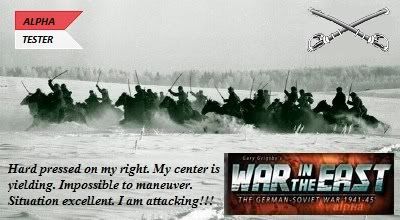IronDuke_slith
Posts: 1595
Joined: 6/30/2002
From: Manchester, UK
Status: offline

|
quote:
ORIGINAL: BigAnorak
We are starting to pick up some worthwhile data, and we are picking up hints on things that might need to be looked at. The post-blizzard figures we are seeing all show that the Axis manpower numbers are recovering well - no one has been below the 3 million that the Germans start the 1942 campaign, but we now need to look at combat effectiveness, experience and morale levels, to see how much variance there is.
It also looks like Axis inability to capture key manpower centres is allowing the Red Army to recruit large numbers of additional men - the recruitment multiplier in 1941 is quite high.
So it looks like the challenge for the Axis Player remains reducing Red Army strength, while capturing the Manpower centres to prevent them recovering their strength. This then leads to the ability to get Kharkov and the Donbas cities before the blizzard, and still be able to put a decent defence together. Personally I am finding this very hard to do, and am having to send many more Panzers divisions south than were there historically, this in turn means I can't get close to Tula and Voronezh.
Keep the info coming.
I think this is the key. I am playing a mirror against a good opponent (he beat me as Soviet in FitE for TOAW, he is a capable Guy)...anyway, we've arrived at Blizzard. I've killed about 3.3 Soviet, he's got 2.8, but my forces seem a lot more than 500k stronger (Most of my front line is held by maximum stacks and I have reserves). The chief difference (I'm guessing) is I hold about 100 points of population centre more than he does, which over the turns has kept plenty of bodies rolling in to my Soviet units that I am guessing has been denied him.
It seems to me the game is trying to create a balanced game for players of equal ability, but 1941 was about an operationally capable force fighting a more numerous, operationally challenged force. When the ponderous force doesn't allow itself to be herded into avoidable pockets, problems are going to arise quite naturally.
Likewise, if the Soviet player doesn't dissipate his strength during the blizzard by attacking everywhere, then he can mass ahistorically and cause a major problem. It also seems that whilst German values fall through the floor, Soviet ones also increase creating a double hit that is difficult to survive.
I do think there is some merit in the idea expressed earlier that a German player who digs in ahistorically early should get some blizzard relief. The reason for this is that the Germans didn't lack winter equipment, what they lacked was the logistical capability of bringing both it and ammunition/food forward at the same time.
Therefore, if a German player has suspended operations very early, dug in closer to his railheads and conserved supplies and ammo as a result of fighting fewer battles, it seems conceivable that more winter equipment could have been brought forward by a supply network that wasn't breaking down just trying to keep units supplied with ammo as it was historically. The downside for the German player here is that whilst he survives the blizzard in better shape, the Soviet player will have lost less ground (and hence lost less pop'n) and be stronger in the spring as well.
Rule wise, If the overall German ammo/supply figure with the units was above a certain level, I'd deem that supply capacity was being used to bring forward winter equipment. This would be a major effort, would reduce supplyto the units considerably and only cover a few units per turn, but it might reward the German player trying a more conservative strategy.
Level three/four forts also implies extensive trench networks with the accompanying bunkers for the troops. These should surely protect soldiers better than hastily dug foxholes hewn out of snow and frozen earth.
All of this is qualified by the caveat that this is otherwise a fantastic game.
Regards,
IronDuke
_____________________________
|
 Printable Version
Printable Version















 New Messages
New Messages No New Messages
No New Messages Hot Topic w/ New Messages
Hot Topic w/ New Messages Hot Topic w/o New Messages
Hot Topic w/o New Messages Locked w/ New Messages
Locked w/ New Messages Locked w/o New Messages
Locked w/o New Messages Post New Thread
Post New Thread